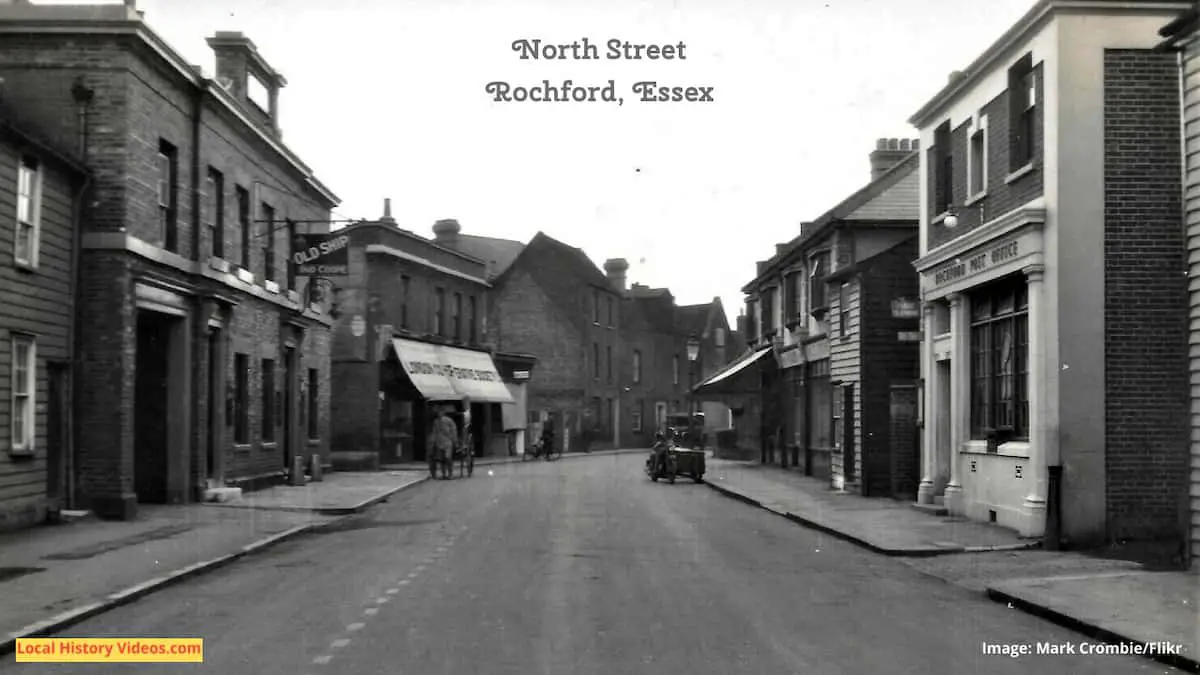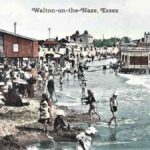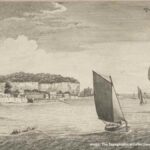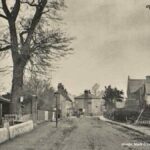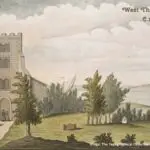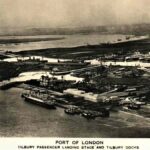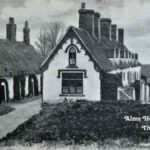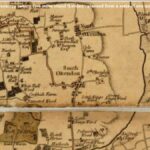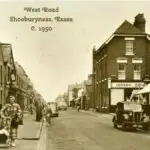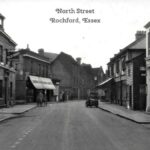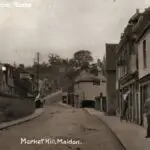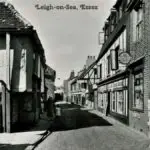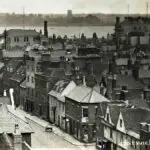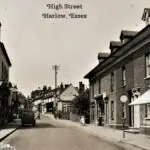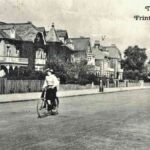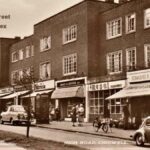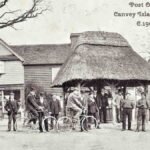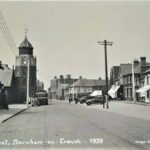Glimpse history through old images of Rochford, Essex, England.
German Bomber Shot Down 1917
On 5th December 1917, 19 Gothas and two Riesenflugzeuge bombers from the Luftstreitkräfte (Imperial German Air Service flew to England for an air raid. More than £100,000 of damage was caused, mostly in London, along with 3 deaths and 15 people injured.
On their way back in the early hours of 6th December 1917, at 04.20 hours, anti-aircraft fire opened above Canvey Island.
It brought down the Gotha GV 906/16 at a golf course in Rochford, Essex, after damage to the port propeller. Despite hitting a tree, the German crew of pilot Gemeiner J. Rzechtalski, observer Lt. RWO Wessels, and gunner Vizefeldwebel OEA Jakobs, not only survived but were unharmed.
A second plane, also with surviving crew, came down at Canterbury, while a third plane and crew was reported missing.
Cecil Day Lewis, who later went on to have an actor son called Daniel Day Lewis, was stationed at the night fighter station RFC Rochford, wrote an account of what happened next, in Sagittarius Raising :
“Some other officers from the aerodrome came to the scene to remove the bombs together with a Very Light pistol. The machine was a wreck, the tanks had burst, and petrol had flooded the ground around. The equipment officer had taken the Very Light pistol and put it into his pocket. As he walked away, he pulled the gun out of his pocket to show a colleague, the trigger caught on his pocket flap, and the pistol went off. The white-hot magnesium flare bounced along the ground towards the wreck, reached thepetrol soaked ground, sending the whole lot up in flames.”
And here is footage of the wreckage left behind.
Bombers shot down in Rochford (1917) – British Pathé on YouTube
Rochford’s airfield closed in 1920 and reverted to farmland. In 1939, the Air Ministry requisitioned the airfield, and throughout World War II it was known as RAF Rochford.
Historic Book
Extract from: The Reliquary and Illustrated Archaeologist, Volumes 17–18
Published in 1877
Pages 158-160
THE ” LAWLESS COURT , ” AT ROCHFORD , IN ESSEX .
BY WILLIAM ANDREWS , F.R.H.S.
It is somewhat remarkable in our day to have a Lawless Court , yet
even at this time , one is maintained at the little town or village of
Rochford , in Essex .
It is held every Wednesday morning next after
Michaelmas – day , at cock – crowing .
The steward and suitors whisper
to each other , and have not any candles nor pen and ink , but supply
that office with a coal ; and he that owes suit and service thereto , and
appears not , forfeits to the lord of the manor double his rent every
hour he is absent .
The Court is termed Lawless on account of being
held at an unlawful or lawless hour , or quia dicta sine lege .
All that is absolutely known of the old practice is the following
quaint Latin verses , published about 1670 , in Blount’s ” Jocular
Customs of some Manors . “
Kingsbill in
Rochford ff
Curia de Domino Rege ,
Dieta sine Lege ,
Tenenta est ibidem
Per ejusdem consuetudinem ;
Ante ortum Solis ,
Luceat nisi Polus ,
Nil seribit nisi Colis .
Tot us voluerit ,
Gallus ut Contaverit ;
Per cujus solum sonitum
Curia es summonita .
Clamat elam pro Rege ,
In Curia sine Lege :
Et nisi cito venerint ,
Cituis puituerint ;
Et nisi elam accedant ,
Curia non attendat ;
Qui venerit eum Lumine ,
Errat in Regimine
Et dum sunt sive lumine ,
Capti sunt in Crimine ,
Curia sine Cura
Jurati de Injuria .
The translation is as follows : – ” King’s Hill , in Rochford , to wit .
The Court of the Lord the King , called the Court without law , ‘
holden there by the custom thereof before sunrise , unless it be twi
light .
The steward , alone , writes nothing but with coals , as often as
he will , when the cock shall have crowed – by the sound of which only
the court is summoned , he crieth secretly for the King in the Court
without law , and unless they quickly come , they shall the more
quickly repent .
He who hath come with a light
erreth in behaviour , and until they be without a light they are taken
in default . ”
As to the origin of this custom , it is stated by Camden ,
” this strange kind of punishment may seem to be inflicted for the
negligence of the inhabitants in guarding the sea – coasts ; ” and he
further observes , ” it seemeth to be a remainder of the old feodary
custom , used by the Emperors of Almain ( Germany ) and Kings of
France , who , when they passed into Italy to receive the imperial crown
at Roncalia , near to Placentia , encamped , and , hanging up a shield
upon an high pole , summoned with a low voice , all that held in fee of
them , to be present , and answer to their names , at midnight , which
whosoever neglected was answered with the loss of his landes . Of
this you may reade Gunther the old Germane poet in his second
booke . “
Local tradition ascribes the origin of this strange practice to a
punishment inflicted , by an early lord of the manor , on his retainers ,
whom he one night discovered plotting his overthrow , and whom he ,
thereupon , compelled to pay homage , which year after year they were
to renew on the same day , between the hour of midnight and dawn ,
on pain of certain ” shrewd fines eftsoons redoubled , if not answered , “
and the whole proceedings were to be conducted in the mysterious
whispers peculiar to conspirators .
In 1862 , Mr. Gregson , of Rochford , solicitor to the Lord of the
Manor , furnished to Dr. Charnock the following information :
” There is a post standing at King’s Hill at which the names of all the tenants ( about
sixteen in number ) are called over ; but very few of them actually attend , although
some one answers for them ; the proceedings are done in a whisper , and the signing
of the rolls is performed by making a mark on the post with a large firebrand , by the
light of which the tenants ‘ names are called over , and proclamations made . The rent
rolls for upwards of one hundred years are in my possession , and during that time
there has been only the loss of one tenant ; the quit – rents are merely nominal ; the
account in Morant is substantially correct ; I have now attended the Court for twenty
five years , and have never found any difficulty in collecting the rents on any pro
ceeding in the Court , and generally a great number attend out of curiosity . “
We have from a gentleman , visiting the Court in 1875 , an amus
ing account of the manner of keeping up the old custom . On reach
ing the market square at Rochford ( he states ) , instead of the silence
belonging to such an hour in such a place , there were found signs of
strange preparations , in the shape of shadowy bearers of unlighted
torches moving to and fro , and waiting for the concerted signal .
From the best Inn’s best room there came sounds of merriment , as of
men who were trying by artificial means to keep up their spirits pre
vious to sallying out on their mission at the ghostly hour .
Soon a
figure , which was afterwards discovered to be that of the steward ,
came to the door , and , invoking silence , returned , to be accompanied
by men bearing burning brands , and by such of the tenants as had
met to be convivial before paying homage laid upon them by that lord
of old .
Through the deserted streets the party , keeping up a con
tinuous cock – crowing , marched until they reached an inclosure , within
which they gathered round a post , in the form of which some person
has pretended to discover the symbol of a burning candle , whatever
connection that may be supposed to have with the story .
Then Mr.
Gregson , the steward , in a voice that was tremulous with suppressed
emotion of some kind – perhaps of veneration for the old rites , or awe ,
or a mingling of both – and in a low whisper , read the proclamation :
” 0 yes ! 0 yes ! O yes ! All manner of persons who do owe suit
and service to this Court now to be holden , in and for the Manor of
King’s Hill , in the Hundred of Rochford , draw near and give your
attendance , and perform your suits and services according to the cus
tom of the said Manor . God save the Queen !
” The genuflexions
which did duty for the ancient humiliation of kneeling were perhaps
hardly as reverent as they might have been ; but then the night was
cold , and kneeling on the grass is not conducive to comfort in such
weather .
The roll of names was then called , among others those of
the ” Master , Fellows , and Scholars of St. John’s College , Cambridge , “
who were supposed to do homage for the possession of Rawreth Hall ,
in Rawreth .
Whether the duty of answering for such a formidable
body had been deputed to a gentleman in fustian with a greasy
” sleeveless body , ” who bore aloft his torch , and flourished it in dan
gerous proximity to the steward’s head , and had crowed so loud that
whispering even became a difficulty to him , I cannot say .
At all
events he seemed to be overwhelmed with the weight of some great
responsibility , and not to know quite when his task was done , for in
answer to every name on the list as Mr. Gregson whispered it , he in
a ” hoarse strange voice ” replied ” here , ” apparently regardless of the
terrors of the strangely constituted Court .
The fourteen names hav
ing been duly responded to , there were no defaulters to be punished ,
and , therefore , no necessity for lingering by the post until the soft
moonlight should give place to the first streak of dawn . With another
quaint proclamation , which gave leave to all persons who had ” ap
peared at this Court to depart hence , keeping their day and hour on
a new summons , ” the whispered ceremony ended .
The cock – crowing
was renewed , after beating their torches against the post to extinguish
them in deference to the condition which declares that those coming
with lights shall be held to have erred in behaviour , the links were
relighted , and the party returned by a different route and devious
ways , according to the immemorial custom of conspirators , to the
King’s Head , where the pilgrimage ended .
More about Essex
- Old Images of Essex, England
- Old Images of West Hangingfield, Essex
- Old Images of Purfleet (Purfleet-on-Thames), Essex
- Old Images of Wickford, Essex
- Old Images of West Thurrock, Essex
- Old Images of Walton-on-the-Naze, Essex
- Old Images of Tilbury, Essex
- Old Images of Thaxted, Essex
- Old Images of South Ockenden, Essex
- Old Images of Shoeburyness, Essex
- Old Images of Rochford, Essex
- Old Images of Maldon, Essex
- Old Images of Leigh-on-Sea, Essex
- Old Images of Harwich, Essex
- Old Images of Harlow, Essex
- Old Images of Halstead, Essex
- Old Images of Frinton-on-Sea, Essex
- Old Images of Chigwell, Essex
- Old Images of Canvey Island, Essex
- Old Images of Burnham-on-Crouch, Essex

